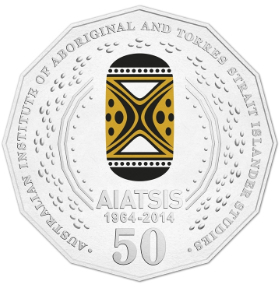History
Timeline results for
Found 1175 results for your search. Showing page 42 of 59.
2014
-
The late Dr Yunupingu from Aboriginal band Yothu Yindi posthumously receives the Companion of the Order of Australia, one of Australia’s highest honours. The award recognises the highest degree of service to humanity.
-
Townsville Council for the first time officially celebrates both Survival Day (on 24 January) and Australia Day (on 26 January).
-
The government proposes legislation to repeal some parts of Section 18C of the Racial Discrimination Act which were used to sue Andrew Bolt for racially vilifying fair-skinned Aboriginal people. After massive protests from all sections of the community it drops its proposal in August.
-
Sydney artist Daniel Boyd becomes the first Aboriginal man to win the Bulgari Art Award, one of Australia’s most esteemed contemporary art prizes, for his work Untitled 2014.
-
The inaugural Australian Indigenous Fashion Week (AIFW) is held in Sydney, showcasing Aboriginal fashion, textiles and accessories from across Australia.
-
Jack Charles becomes the first Aboriginal person to win a lifetime achievement award at the Victorian Green Room Awards for the show Jack Charles v the Crown.
-
Aboriginal singer Jessica Mauboy performs as a guest singer at the 59th Eurovision Song Contest in Copenhagen, becoming the first guest singer from a non-European Union country.
-
The Australian government axes more than $534 million dollars from Aboriginal programmes in the federal budget. It cuts more than $160 million from Aboriginal health programmes.
-
Inaugural National Indigenous Human Rights Awards at the NSW state parliament. Among the categories are the Dr M Yunupingu Human Rights Achievement Award (awarded to Arrernte elder Rosalie Kunoth-Monks), the Edward ‘Koiki’ Mabo Social Justice Award (awarded posthumously to Arthur and Leila Murray) and the Anthony Mundine Courage Award (awarded to Gamilaroy woman Barbara McGrady).
There is no greater rights struggle on this continent than that of the Aboriginal struggle.
— Shaoquett Moselmane, NSW parliamentarian who conceived of the awards [1] -

A small number of coins (about 30,000) show the AIATSIS logo in colour. The Royal Australian Mint issues a 50 cent coin commemorating the 50th anniversary of the Australian Institute of Aboriginal and Torres Strait Islander Studies (AIATSIS). The coin shows the AIATSIS logo, derived from the boomerang totem of the Gu:na:ni (Kunjen) people from the Mitchell River region, Gulf of Carpentaria, North Queensland. The design illustrates the symmetrical style of north-eastern Queensland art, and utilises rich colours used in Aboriginal works of art. A small number of coins shows this logo in colour.
-
The Charité Medical Museum returns 14 skulls of Aboriginal people to representatives of the Goemulgal, Lag Mabuyag and Wajarri Yamatji peoples. It also repatriated remains to Namibia (2011 and 2014) and to Paraguay (2012).
-
The federal government — without consultation — announces that it would stop providing funding to remote homeland communities from 1 July 2015, prompting Western Australia and South Australia threaten to close “unviable” communities.
-
Prime Minister Tony Abbott spends a week at Gulkula in north-east Arnhem Land, meeting Aboriginal leaders and community members and running the country from his campsite. He is accompanied by other ministers and a team of bureaucrats.
-
The University of Sydney suspends Professor Barry Spurr after some of his racist emails were published. Among other racial slurs, he called Aboriginal people “Abos” and PM Tony Abbott an “Abo lover”.
-
Gough Whitlam dies aged 98. Gurindji Elder, Michael George, commented, “As a mark of respect, Gurindji people will now refer to this man as ‘kulum Whitlam’... This great man helped us get better wages, health, education and housing, and most importantly, gave us our land back.” In 1975, Whitlam returned their land to the Gurindji.
-
France and Australia sign an agreement on the repatriation of remains. A joint expert committee will help identify the origin of Aboriginal Australian remains held in France.
-
Freedom Summit at the Old Telegraph outside of Mparntwe (Alice Springs) which leads to the formation of the Freedom Movement which aims to talk about, define and agree on a treaty. "A Treaty from the people – a salt of the earth, grass-roots document that respects the First Peoples, that is of, and by, the First Peoples of this continent." [2]
-
Defence returns the nuclear weapons testing range in the Woomera Prohibited Area to traditional Aboriginal owners, the last parcel that hadn’t been returned.
-
Traditional Owners, leaders, elders and community members from across Australia gather in Mparntwe (Alice Springs) for the Freedom Summit declaring the independence, sovereign power and authority of their nations and peoples. The summit endorses a delegation of 20 to stand up united and reclaim the “Aboriginal Rights Struggle”. The summit’s spirits lives on in the Freedom Movement.
-
Amendments to the Police Administration Act (NT) commence which provide for ‘paperless arrests’, allowing the police, without a warrant, to detain a person in custody for up to 4 hours, or longer if the person is intoxicated. The laws are believed to disproportionally affect Aboriginal people.
